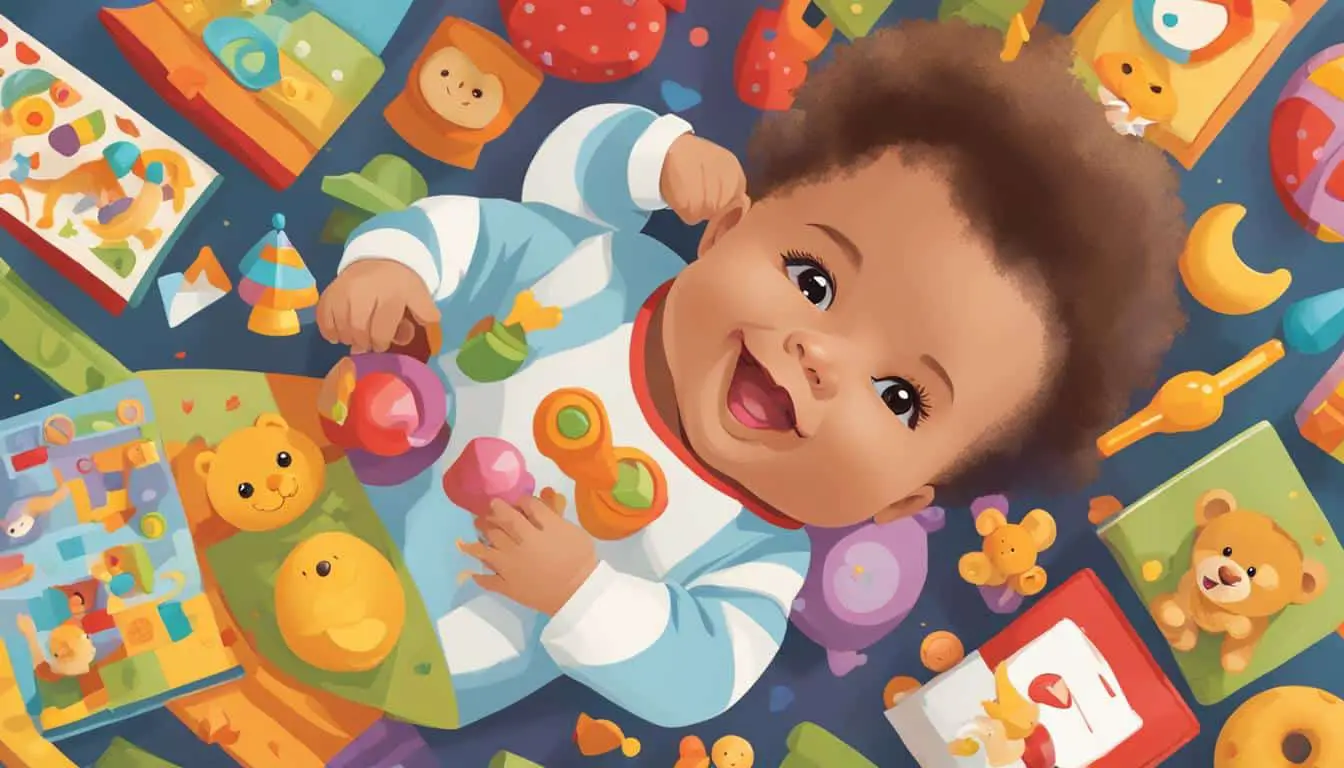
Supporting Baby’s Language Development: Effective Strategies
When it comes to supporting your baby’s language development, there are several effective strategies you can implement. By understanding the importance of communication and language skills, you can provide the necessary support to enhance your infant’s language development. According to research, talking to your child and engaging in interactive activities can significantly contribute to their language acquisition. Additionally, using gestures, providing descriptive language, and modeling bigger and better sentences can further aid in their language learning process. Singing with your baby and exposing them to books and written words are also recommended strategies for promoting language development. By implementing these strategies and giving your baby time to learn and explore at their own pace, you can effectively support their language development journey.
Key Takeaways:
- Baby language development can be enhanced through effective strategies.
- Talking to your baby and engaging in interactive activities is important for language acquisition.
- Using gestures and providing descriptive language can aid in language learning.
- Singing with your baby and exposing them to books are recommended strategies.
- Give your baby time to learn and explore at their own pace.
The Stages of Baby’s Language Development
A baby’s language development progresses through several stages during their early years. These stages, characterized by specific speech and language milestones, play a vital role in nurturing their communication skills. Understanding the stages of language development can help parents and caregivers support and promote the growth of their baby’s speech and language abilities.
During the first year of life, babies engage in cooing and smiling as their primary means of communication. They begin to babble and use gestures to express themselves. Between 12 to 18 months, babies start speaking their first words with meaning and comprehend more words than they can articulate.
As toddlers enter the 18-month to 2-year stage, they begin to combine words and use simple pronouns. Their sentences become longer and more complex as they reach 2 to 3 years of age, learning to use plurals and past tenses. Finally, between 3 to 4 years old, children improve their conversation skills and can speak more clearly, forming sentences with greater clarity and fluency.
Understanding these milestones helps parents gauge their child’s language development progress and provides insight into their abilities at various ages. It is important to note that each child develops at their own pace, and these stages are general guidelines. It is crucial to provide a language-rich environment and employ effective strategies to support their speech and language development.

| Age | Language Development Milestones |
|---|---|
| 0-12 months | Cooing, smiling, babbling, and using gestures |
| 12-18 months | First words with meaning, comprehending more words than they can say |
| 18 months-2 years | Combining words, using simple pronouns |
| 2-3 years | Longer sentences, plurals, and past tenses |
| 3-4 years | Improvement in conversation skills and clear speech |
By being aware of these stages and providing a supportive environment, parents can actively engage in activities that encourage their baby’s language development. The next section will explore effective strategies to enhance and promote speech and language skills in babies.
Strategies to Enhance Baby’s Language Development
When it comes to supporting your baby’s language development, there are several effective strategies that can encourage communication skills and promote speech and language development. By implementing these strategies, you can create a language-rich environment that aids in your baby’s language acquisition and overall cognitive development.
One effective strategy is to get your baby’s attention before speaking. By facing them and using their name, you can captivate their focus and engage them in communication. This strategy sets the stage for effective language learning and ensures that your baby is actively listening and engaging with you.
Engaging in fun activities is another effective way to enhance your baby’s language development. Singing, making noises, and using gestures can stimulate language acquisition and make the learning process enjoyable. These activities create opportunities for your baby to explore sounds, imitate gestures, and develop their communication skills in a playful and engaging manner.
Using descriptive language and avoiding questions can also support your baby’s language development. Instead of asking direct questions, try engaging in a conversation and commenting on what your baby is doing. This allows your baby to hear and understand more language, expanding their vocabulary and comprehension skills.
Repeating what you say and building on what your baby says are additional strategies that can enhance their language development. By repeating your words, you reinforce vocabulary and help your baby understand the meaning behind the words. Building on their words and sentences encourages them to expand their language skills and communicate more effectively.
Ultimately, the key to enhancing your baby’s language development is to create a language-rich environment that supports their communication skills. By implementing these effective strategies, you can play an active role in promoting your baby’s speech and language skills, setting the foundation for their future communication abilities.
| Strategies to Enhance Baby’s Language Development | Benefits |
|---|---|
| Get your baby’s attention before speaking | Engages baby in communication, ensures active listening |
| Engage in fun activities like singing and gestures | Stimulates language acquisition, makes learning enjoyable |
| Use descriptive language and avoid questions | Expands vocabulary, improves comprehension skills |
| Repeat what you say and build on baby’s words | Reinforces vocabulary, encourages language expansion |
Conclusion
In conclusion, supporting a baby’s language development is essential for promoting their overall communication and cognitive skills. By implementing effective strategies, you can create a language-rich environment that supports infant communication skills and promotes speech and language development.
Through talking to your baby, using gestures, and providing descriptive language, you can actively engage your little one in language learning. Additionally, exposing them to books, songs, and interactive activities can further enhance their language acquisition.
It is important to remember that each baby progresses through language development stages at their own pace. By being aware of their milestones and giving them time to learn, you can effectively support their language development journey.
If you have any concerns or questions about your baby’s speech and language development, it is always advisable to seek help from a speech and language therapist or healthcare professional. They can provide guidance and support tailored to your baby’s individual needs.
FAQ
What are some effective strategies to enhance a baby’s language development?
Talking to your child, engaging in interactive activities, using gestures, providing descriptive language, modeling bigger and better sentences, singing with your baby, and exposing them to books and written words are recommended strategies for promoting language development.
What are the stages of a baby’s language development?
The stages of language development include cooing and smiling, babbling and gesturing, saying first words, combining words and using simple pronouns, forming longer sentences and using plurals and past tenses, and improving conversation skills and clearer speech.
How can I support my baby’s language development?
Some strategies to enhance your baby’s language development include getting their attention before speaking, engaging in fun activities, using simple language with short sentences, repeating and building on what your baby says, speaking in your home language, avoiding dummies during conversations, showing understanding and copying their sounds and sentences, and seeking professional help if needed.
Why is supporting a baby’s language development important?
Supporting a baby’s language development is crucial for their overall communication and cognitive development, as it establishes a strong foundation for their future communication skills and overall well-being.
Source Links
- https://www.naeyc.org/our-work/families/support-language-development-infants-and-toddlers
- https://www.highspeedtraining.co.uk/hub/supporting-language-development-in-the-early-years/
- https://www.nct.org.uk/baby-toddler/learning-talk-and-communication-your-baby/how-can-you-encourage-childs-language-development